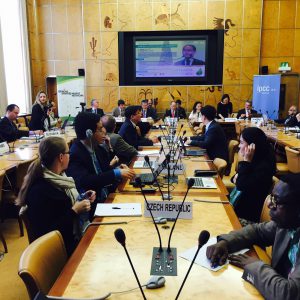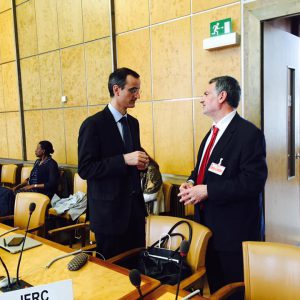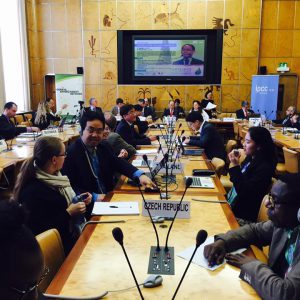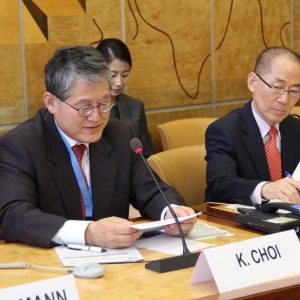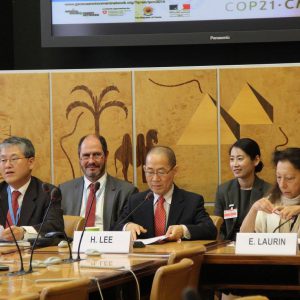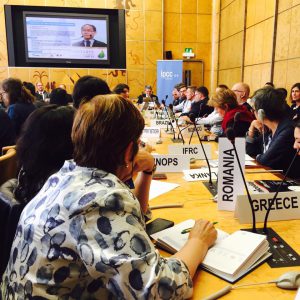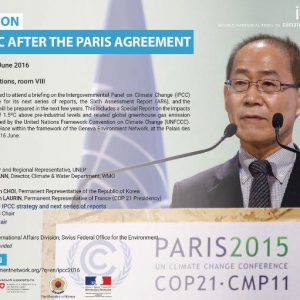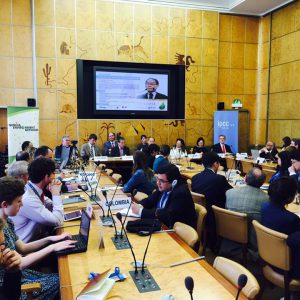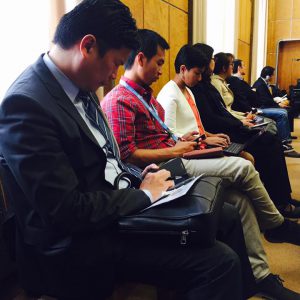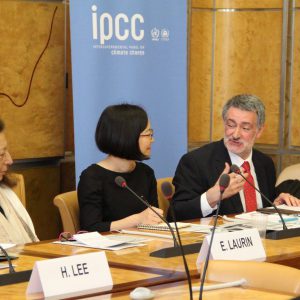Event Conference
The IPCC after the Paris Agreement
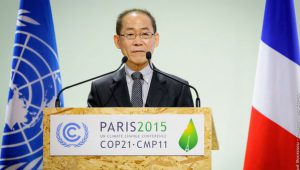
16 Jun 2016
15:00–16:15
Venue: Palais des Nations | Room VIII
Organization: Geneva Environment Network
A briefing on the Intergovernmental Panel on Climate Change (IPCC) strategy and timeline for its next series of reports, the Sixth Assessment Report (AR6), and the Special Reports that will be prepared in the next few years, took place within the framework of the Geneva Environment Network, at the Palais des Nations on Thursday 16 June. This includes a Special Report on the impacts of global warming of 1.5ºC above pre-industrial levels and related global greenhouse gas emission pathways as requested by the United Nations Framework Convention on Climate Change (UNFCCC).
Agenda
Welcome
Rie TSUTSUMI, Programme Officer, Regional Office for Europe, UNEP
Johannes CULLMANN, Director, Climate & Water Department, WMO
Opening remarks
H.E. Amb. Kyonglim CHOI, Permanent Representative of the Republic of Korea
H.E. Amb. Elisabeth LAURIN, Permanent Representative of France (COP 21 Presidency)
Presentation of the IPCC strategy and next series of reports
Hoesung LEE, IPCC Chair
Q & A with IPCC Chair
Closing remarks
José ROMERO, International Affairs Division, Swiss Federal Office for the Environment
Summary
Watch the video of the event on the IPCC facebook page: https://www.facebook.com/IPCCNews/videos/1008352435880467/
Active movements around climate change after Paris Agreement
- As of 22 April, 175 countries signed to Paris Agreement and ratification is under process in each country, France being the first country to complete the ratification.
- Rie Tsutsumi from UNEP highlighted the importance of the IPCC, an essential component of the science-policy interface that UNEP supports for its essential contribution to help implementing a sound environmental and development policy leading to sustainable development. She mentioned GEO 6 was launched in Batumi, indicating efforts of pan European countries on mitigation.
- J. Cullimann said that WMO, as parent organization, with UNEP, of the IPCC, fully supports the work of the Panel in particular through the global monitoring of the climate system. In agreement with the representative of UNEP, he pointed out the importance of the work of the experts in support of the scientifically-based answers to policy-relevant questions. He stressed that WMO is focusing their research on ocean and its linkages with carbon cycle as well as on establishing GHG national inventory to support IPCC’s Sixth Assessment Report (AR6).
- H.E. Amb. Kyonglim Choi, indicated that the Republic of Korea expressed its support to the IPCC and considered that the IPCC has an important role to play after the agreement reached in Paris in informing the international community to help it engaging in the necessary climate action as a step towards sustainable development. He mentioned the needs for urgent actions to combat climate change and a new regime of Korean government to increase engagements from business sector.
- H.E. Amb. Elisabeth Laurin, expressed satisfaction that the IPCC with its experts supports the climate process. She announced that France had ratified the Paris Agreement and hoped that the other countries will follow quickly, although this is not the end of the story since if nothing more is done, global temperature will increase by more than 3 degrees compared to preindustrial times. She pointed the important role of IPCC in shaping global climate negotiations based on scientific evidence. She also expressed satisfaction on the fact that the IPCC will prepare a Special Report on oceans and the Cryosphere. She emphasized collaborative efforts in order to enact Paris Agreement and make “1.5 ”scenario feasible.
Presentation of the IPCC strategy and next series of reports
- IPCC Chairman Hoensung Lee explained the role of IPCC in providing scientific evidence on the physical as well as socio-economic impacts of climate change to inform decisions on all levels.
- The chairman updated on current progress made from the latest panel meeting in April. In this 6th term, the Panel agreed to undertake three Special Reports (SRs) on:
- the impacts of global warming of 1.5°C above preindustrial levels and related global greenhouse gas (GHG) emission pathways;
- climate change, desertification, land degradation, sustainable land management, food security and GHG fluxes in terrestrial ecosystems; and
- climate change and oceans and the cryosphere.
- The IPCC report will be used as an input for the global stocktaking, which is the five-yearly reviews of progress on global emission reductions. Hence, future reports will be produced in line with the five-yearly rhythm of global stocktaking rather than conventional 6-7 years term.
- The final AR6 will be completed by 2022 and global stocktake from governments will start from 2023.
- IPCC has identified major information and research gaps and planned to issue the first special report in 2018 on the “Impacts of global warming of 1.5 ºC above pre-industrial levels and related global greenhouse gas emission pathways”.
- The scoping meeting will be held in August and the panel meeting in October this year will finalise the detailed outline and structure of the report.
- The 195 member states nominated over 600 candidates for participants of the scoping meeting.
- The first special report and the summarized policy brief will be issued in 2018.
Special focus
- In the special report, particular attention will be given to address the following points:
- Earlier and more efficient mitigation options (solution-oriented) and implementation guidance of low carbon technologies,
- Negative mitigation measures such as geoengineering technologies,
- Research on artic sea, mechanisms of potential tipping points in ocean circulation patterns,
- Scale of land degradation resulting from climate change and its impacts on human insecurity,
- Downscaling on socio-economic impacts of climate change in a regional and local level,
- Active participation from scientific community in developing countries,
- In-depth research on costs of inaction for adaptation, benefits of action.
- The final AR6 will include the updated and refined version of the “Methodology Report: Guidelines for National GHG Inventories” developed in 2006.
José Romero made closing remarks summing up the various elements of the interventions, and what could be take-aways from the event. The IPCC is part of the global science-policy interface. It is a scientific body independent of any political influence. It is fit, responsive to the UNFCCC and prepares its sixth Assessment Report, Special Reports and methodologies. The mission of the IPCC is to provide policy-relevant but not policy-prescriptive information in support of societal transformation, e.g. from combustion of fossil fuels to renewable sources. The IPCC needs the support of countries in mobilizing finance and experts, particularly from developing countries.
Documents
- Invitation
- Welcoming Remarks by H.E. Ambassador Elisabeth LAURIN
- Opening Remarks by H.E. Ambassador Kyonglim CHOI
- Presentation by Hoesung Lee, IPCC Chair

